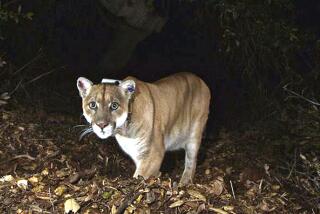Cars are killing bobcats at an alarming rate in Southern California, biologists say
At least six bobcats have been struck and killed by vehicles in the Santa Monica Mountains in the past three months, including one that had been captured and collared by wildlife officials shortly before the Woolsey fire, the National Park Service said.
The collared bobcat, known as B-361, roamed between the natural and burn-scarred areas of Malibu Canyon and died after being struck by a vehicle on Las Virgenes Road in Calabasas, the park service tweeted in March. B-361 was one of several bobcats monitored with tracking devices after the Woolsey fire, which torched more than 96,000 acres and displaced untold numbers of animals.
Biologists noted that one of the cats that was struck was a lactating female. The litter of another recently collared survivor of the Woolsey fire, B-362, was discovered last month. Kittens are typically born in April and May.
Other cats were killed on Mullholland Highway in Calabasas and on Potrero and Lynn roads in Thousand Oaks.
Vehicle deaths are a common cause of bobcat fatalities, second only to mange, a skin disease — often found in animals that have also ingested rat poison — that has led to a decline in the bobcat population since 2002.
But the number of cats killed by cars in such a short amount of time is unusual, scientists say. Joanne Moriarty of the National Park Service says she’s never seen this high a mortality rate from vehicle deaths in the 15 years she has studied bobcat patterns in the Santa Monica Mountains.
Though not for certain, Moriarty said the Woolsey fire may have played a role in the uptick in deaths as animals traverse larger areas to find resources needed for their survival.
She estimates that there are about 300 bobcats in the Santa Monica Mountains, and cautions drivers to watch for wandering cats in the area.
“This is their habitat, too.”
More to Read
Sign up for Essential California
The most important California stories and recommendations in your inbox every morning.
You may occasionally receive promotional content from the Los Angeles Times.











